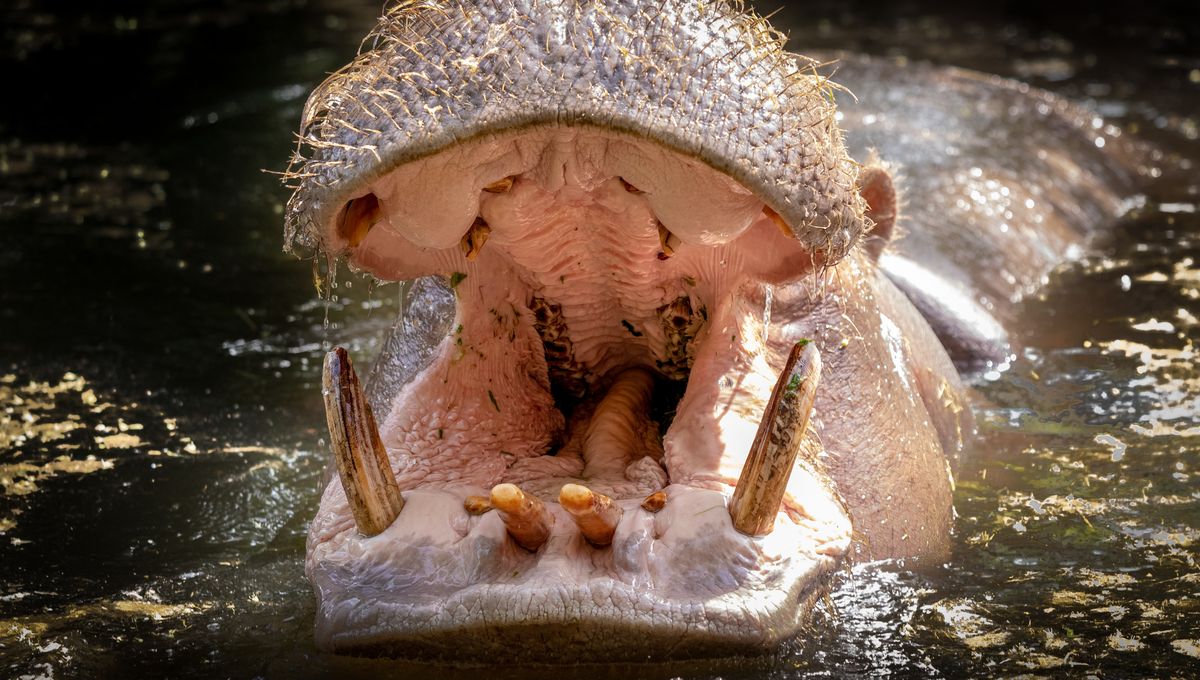
Hippo teeth are not to be underestimated. I mean, have you seen them? They chomp through entire pumpkins like it’s no big deal. So how on Earth do you go about it when those sharp ol’ chompers need a bit of extra help to stay clean?
Calgary Zoo has some answers for us. Its resident male hippo, Lobi, needs daily dental care, as his lower canines are susceptible to gingivitis, a mild form of gum disease that can cause redness, soreness, swelling, and bleeding.
To stop that from happening, keepers first spray water into Lobi’s mouth to get rid of any debris. Then they get going with the electric toothbrush, which is surprisingly human-sized. “This toothbrush helps the team reach in close to the gums and give Lobi a deep clean,” the zoo explains in the description of a video of the process.
“After that, a syringe of hydrogen peroxide helps to keep Lobi’s teeth and gums beautiful and healthy so he can keep doing what he does best – chomping on food!” the zoo adds.
In the wild, no such brushing occurs – and given that hippos are the world’s deadliest large land mammal, we wouldn’t recommend trying it either. Save your precious fingers and instead sit back and let barbels do all the hard work.
These common fish have a mutualistic relationship with hippos, meaning both animals get something beneficial out of it. When a hippo goes into the water (walking, not swimming), a shoal of barbels begins to nibble away at any parasites on the hippo’s skin – and might even snack on dung while they’re there too.
Then, the hippo opens its mouth, allowing the barbels to swim in and start cleaning up any food or other debris stuck to its teeth. It’s a win-win situation; the hippo gets a nice clean mouth, and the barbels get a tasty snack.
Hippos in zoos aren’t necessarily going to have access to a nice big lake full of wannabe-dentist barbels, so it makes sense that they might need a human with a brush to help them keep their teeth clean and healthy – but that’s not the case for every animal.
“We have to first of all understand that brushing doesn’t stop decay,” Peter Kertesz – who’s a dental consultant to ZSL London Zoo alongside his job as a dentist for humans – told IFLScience.
“Diet will, and don’t forget, we are on an unnatural diet that’s very often, heavy on refined carbohydrates, and that is going to cause the decay. If you’re going to stop the decay, you’re going to have to change the diet.”
If a zoo animal is on its natural diet, then a visit from the dentist is more likely to be down to a chip or a break than a cavity.
“Trauma is very, very common. Decay is not that common,” said Kertesz. “It’s fairly rare because their diets are relatively natural, certainly in Europe. They don’t have refined carbohydrates. They usually have a self-cleansing diet. In North America, it’s a bit different. They get a lot of processed food, but trauma is the biggest problem.”
Keen to see an example? Look no further than Tundra, the brown bear who fractured his tooth and ended up receiving the world’s largest veterinary crown.
Source Link: How Do We Brush A Hippo’s Teeth?